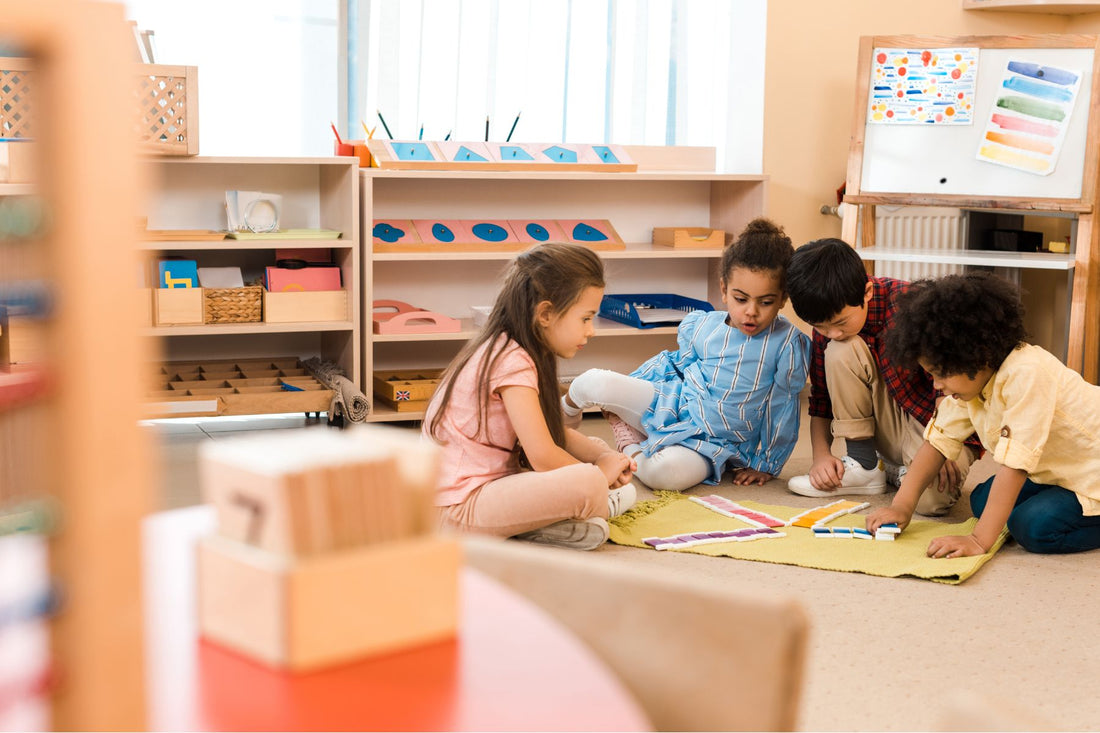
Your Research-Backed Guide to Montessori Principles And Its Benefits for Toddlers in Australia
Nina PaulusShare
Dr Maria Montessori, one of the most influential figures in early childhood education, developed a distinctive approach to learning more than a century ago. Known as the Montessori method, this educational philosophy emphasises the role of children's natural curiosity in their learning process, fostering a lifelong passion for knowledge. This article aims to provide a comprehensive guide to the core Montessori principles and highlight the unique benefits these principles can bring to toddler development. By understanding and embracing these principles, parents and educators can create an environment that nurtures independence, cognitive development, social skills, curiosity, creativity, fine motor skills, and emotional growth in toddlers.

Montessori Principles
The heart of the Montessori method revolves around five primary principles. Understanding these principles is critical to appreciating the Montessori approach's unique potential.
- Respect for the Child: This principle is the bedrock of Montessori education. A deep-seated respect for children underpins every facet of Montessori teaching. This respect manifests in recognising and valuing children's ideas, preferences, and pace of learning. Children can choose their activities and explore their surroundings, engendering an atmosphere that nurtures autonomy and individuality.
- Absorbent Mind: Central to Montessori's philosophy is her belief that children can absorb information from their surroundings. This principle is predicated on the notion that children derive knowledge from the environment unconsciously during their early years and consciously as they grow older.
- Prepared Environment: The third principle underscores the importance of a conducive learning environment for children. Montessori classrooms are thoughtfully designed to be child-friendly, organised, and replete with materials that stimulate exploration and learning.
-
Auto education: The Montessori method fosters self-directed learning, stemming from the belief that children learn most effectively when their curiosity is piqued and interest kindled. In this approach, the educator's role is not to impart information but to guide and facilitate the child's learning journey.
-
Sensitive Periods: Montessori identified specific time frames in a child’s development when they are particularly receptive to learning specific skills or information. These 'sensitive periods' are opportunities to optimise learning experiences.

Benefits of Montessori for Toddlers
When applied to toddlers, the Montessori principles yield a host of tangible benefits:
-
Fosters Independence: The autonomy that the Montessori approach affords children helps instil a sense of independence from an early age. Toddlers learn to execute tasks independently, from simple acts like picking up toys to more complex functions like preparing snacks. This autonomy not only bolsters their self-esteem but also hones their problem-solving abilities.
A study by Namuddu, Betty; Vance, Emily; and Litton, Victoria. (2019) found that children with a Montessori education at home showed higher independence than those who weren't exposed at home. The fostering of independence in the Montessori approach contributes to this positive self-perception.
-
Promotes Cognitive Development: Montessori teaching seeks to impart knowledge to children through practical life experiences. Activities like matching colours, counting objects, and sorting shapes offer hands-on experiences that enhance cognitive development.
A study by He, H. L., Yan, H., Zuo, L., Liu, L., & Zhang, X. P. (2009) examined the effects of Montessori education on cognitive development in children aged 2 to 4. The researchers found that Montessori kindergarten children outperformed their peers in large motor ability, fine movements, language, and social behaviour. skills. The hands-on nature of Montessori activities was suggested as a contributing factor to these cognitive gains.
-
Enhances Social Skills: Montessori classrooms often comprise children of various ages, which creates opportunities for younger children to learn from older ones. This environment fosters mutual respect, empathy, and cooperation, nurturing social skills.
A study by Gökhan Kayılı, Ramazan Arı (2016) compared the social understanding of children in Montessori and traditional kindergartens. The researchers found that Montessori students demonstrated higher levels of social understanding. The mixed-age classrooms in Montessori education were instrumental in promoting these positive social interactions.
-
Encourages Curiosity and Creativity: The rich learning materials in a Montessori environment invite children to explore and satiate their curiosity. This active exploration spurs creativity and cultivates a genuine love for learning.
A study by Denervaud, S., Christensen, A.P., Kenett, Y.N. et al. (2021) explored the impact of the Montessori approach on creativity in young children. The researchers found that children in Montessori classrooms exhibited higher levels of creativity than those in traditional classrooms. The Montessori approach's emphasis on self-directed learning and the freedom to explore materials was attributed to fostering this creativity.
-
Develops Fine Motor Skills: Many Montessori activities involve hands-on tasks like threading beads, spooning rice, or manipulating puzzles. These tasks offer an excellent avenue for improving hand-eye coordination and refining fine motor skills, vital for later tasks such as writing.
A study by Bhatia, P., Davis, A., & Shamas-Brandt, E. (2015) found that children who received a Montessori education in early childhood displayed higher levels of fine motor skills than their peers who weren't exposed to Montessori education. The hands-on activities and materials in the Montessori approach contributed to developing fine motor skills.
-
Supports Emotional Growth: Montessori principles extend beyond cognitive and motor skill development to emotional growth. Respecting and acknowledging children's feelings teach them to express their emotions healthily. This acknowledgment promotes emotional understanding and regulation from an early age.
A study by Esra Dereli İman, Şahin Danişman, et all (2019) examined the social competence and behaviors of 3.5–5 years-old-children on their emotion regulation skills. The researchers found that Montessori-exposed kids demonstrated higher levels of social competence and behaviour and emotion regulation skills.

The Montessori approach provides toddlers with the tools to foster holistic development. It instils a sense of curiosity, independence, respect, and a love for learning; all carried through life. Therefore, integrating Montessori principles into your toddler's education, whether in school or at home, can yield rewarding results. However, it's important to remember that each child is unique, and adapting the principles to their learning style is crucial. By embracing the Montessori approach tailored to your toddler's needs, you can lay a solid foundation for their lifelong love of learning and personal growth.
You can find a range of Montessori toys in the Little Travellers shop.

References:
Bhatia, P., Davis, A., & Shamas-Brandt, E. (2015). Educational gymnastics: The effectiveness of Montessori practical life activities in developing fine motor skills in kindergartners. Early Education and Development, 26, 594–607. https://doi.org/10.1080/10409289.2015.99545
Denervaud, S., Christensen, A.P., Kenett, Y.N. et al. (2021). Education shapes the structure of semantic memory and impacts creative thinking. npj Sci. Learn. 6, 35 (2021). https://doi.org/10.1038/s41539-021-00113-8
Esra Dereli İman, Şahin Danişman, et al (2019). The effect of the Montessori education method on pre-school children’s social competence – behaviour and emotion regulation skills, Early Child Development and Care, 189:9, 1494-1508, DOI: 10.1080/03004430.2017.1392943
Gökhan Kayılı, Ramazan Arı (2016), Journal of Education and Training StudiesNo 4, Volume 12, DOI: https://doi.org/10.11114/jets.v4i12.1965
He, H. L., Yan, H., Zuo, L., Liu, L., & Zhang, X. P. (2009). Effects of Montessori education on the intellectual development in children aged 2 to 4 years. Zhongguo Dang dai er ke za zhi= Chinese Journal of Contemporary Pediatrics, 11(12), 1002-1005.
Namuddu, Betty; Vance, Emily; and Litton, Victoria. (2019). The Effects of Implementing Montessori at Home on Children’s Independence and Self-Regulation in a Montessori Classroom. Retrieved from Sophia, the St. Catherine University repository website: https://sophia.stkate.edu/maed/294




